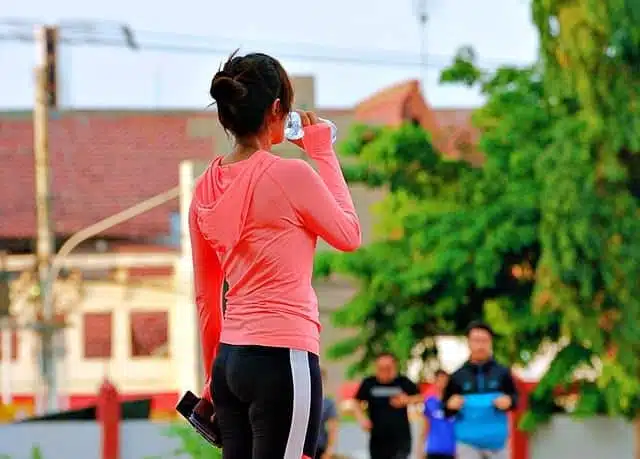The Ultimate Guide to Hydration for Athletes
As a professional athlete with a Master’s Degree in Nutrition Education, I can confidently say that hydration for athletes is one of the most overlooked yet critical factors influencing performance, recovery, and long-term health.
Although many athletes never consciously think about the effects on adequately hydrating, water and electrolytes regulate blood volume, stabilize body temperature, and ensure muscles and nerves function properly during training and competition.
With so many sports drinks, supplements, and hydration products marketed as essential, it’s important to separate evidence-based solutions from gimmicks.
By understanding how fluids, electrolytes, diet, and environmental factors impact hydration, athletes can create strategies tailored to their sport, body, and performance goals.
This guide explores everything you need to know about hydration for athletes including the role of hydration for athletes and the best hydration hacks for peak performance, so you can train harder, recover faster, and stay healthier throughout your career.
Why is Hydration Important for Athletes?
Hydration is important for athletes as it affects every physiological function in the body.
-Adequate hydration maintains blood volume, regulates body temperature, and supports muscle function.
-Dehydration can impair athletic performance, increase the risk of heat stress, and cause severe health issues.
Risks of Inadequate Hydration Strategies
Inadequate hydration can result in dehydration or hyponatremia, which can both have serious affects on your health and performance.
Dehydration
Signs of dehydration include thirst, reduced urine output, dark yellow urine, fatigue, dizziness, and confusion.
Athletes might also experience decreased performance, muscle cramps, and increased heart rate.
Early recognition and intervention are key to preventing severe dehydration.
Hyponatremia
Hyponatremia, or overhydration, occurs when an athlete consumes too much fluid without adequate sodium, diluting blood sodium levels.
It can cause symptoms like nausea, headache, confusion, and in severe cases, brain swelling and death.
Balancing fluid and electrolyte intake is crucial to prevent this condition.
How Hydration Needs Vary By Sport or Excercise Type
Hydration needs indeed vary by sport and activity level.
Endurance sports like marathon running or cycling require more fluid intake due to prolonged sweating, whereas sports like weightlifting might demand less.
Factors like the intensity of the activity, duration, and environmental conditions also play a significant role.
Climate and Altitude Effects on Hydration
Hot, humid climates and high altitudes increase fluid loss through increased sweating and respiratory fluid loss, respectively.
Athletes in these environments require more fluid intake and should be extra vigilant about staying hydrated.
How Should Athletes Hydrate Before, During, and After Exercising?
Before Exercise:
Athletes should aim to start their exercise or competition in a well-hydrated state. This involves drinking fluids throughout the day leading up to the event, not just immediately beforehand.
The American College of Sports Medicine recommends drinking about:
- 500-600 mL (17-20 ounces) of water at least two to three hours before exercise
- 200-300 mL (7-10 ounces) 20-30 minutes before starting.
The color of the urine is a practical indicator; a light straw color suggests adequate hydration.
During Exercise:
Maintaining hydration during exercise is critical, especially in long-duration or high-intensity activities. Athletes should aim to replace fluid lost through sweat at a rate that matches their sweat loss.
This can be estimated by drinking at regular intervals, ideally every 15-20 minutes, and consuming 200-300 mL (7-10 ounces) of fluid.
In events lasting longer than an hour or in very hot conditions, incorporating a sports drink with electrolytes and carbohydrates can help maintain energy levels and electrolyte balance.
Post- Exercise:
After exercising, the goal is to restore any fluid and electrolyte balance lost during the activity. Athletes should weigh themselves before and after exercise to estimate the total fluid loss – each pound (0.45 kg) lost equates to about 16 ounces (approximately 475 mL) of fluid that needs to be replaced.
The National Athletic Trainers’ Association (2000) suggests consuming 1.5 times the fluid lost within 2 hours post-exercise.
Including sodium in post-exercise meals or snacks can also help expedite rehydration by stimulating thirst and retaining the consumed fluids.
How Diet Impact’s Hydration for Athletes
The role of diet in an athlete’s hydration status is multifaceted.
Foods with high water content, such as fruits (like watermelon, strawberries, and oranges) and vegetables (like cucumbers, lettuce, and celery), can significantly contribute to overall hydration.
These foods are not only rich in water but also contain essential electrolytes like potassium, which aid in maintaining fluid balance.
Conversely, certain dietary choices can increase an athlete’s fluid requirements.
High-protein diets, for example, may lead to increased water needs as the body uses more water to metabolize protein and eliminate nitrogen waste products.
Given these factors, it’s important for athletes to not only focus on fluid intake but also consider the hydration impact of their overall diet.
Including a variety of hydrating foods and being mindful of the effects of high-protein, caffeinated, and alcoholic beverages can help maintain optimal hydration levels, which is crucial for peak athletic performance and recovery.
Effects of Caffeine on Hydration
Caffeine is one of the best supplements for athletic performance, but caffeine also plays a role in your hydration status, and athletes need to be mindful of their caffeine intake.
Caffeine has a diuretic effect on the body, but the source of your caffeine consumption plays a critical role in whether consuming caffeine impacts your hydration status or not.
Drinking coffee or tea does not have a significant effect on your hydration levels.
A 2014 study on the level of hydration of coffee drinkers showed no variable change in overall hydration after switching from 3-6 cups of coffee per day to water (Killer et al, 2014).
Similarly, another study concluded that drinking black tea demonstrated no significant differences for hydration levels than drinking water (Ruxton & Hart, 2011).
However, consuming energy drinks or pre workout supplements that are extremely high in caffeine can promote dehydration and hypohydration (Alsunni, 2015).
If you are going to consume caffeine, be mindful of the amount of caffeine you consume and the source of your caffeine consumption.
If you are drinking coffee or tea, you probably don’t have to worry about becoming additionally dehydrated.
However, if you are consuming energy drinks or high-caffeine pre workout supplements, you may want to consume a bit more water.
Role of Electrolytes in Athletes’ Hydration
Electrolytes, primarily sodium, potassium, calcium, and magnesium, are essential for hydration as they help maintain fluid balance and support nerve and muscle function.
During exercise, athletes lose electrolytes through sweat, making it necessary to replenish them, especially in long-duration or high-intensity workouts.
What Are the Best Hydration Drinks for Athletes?
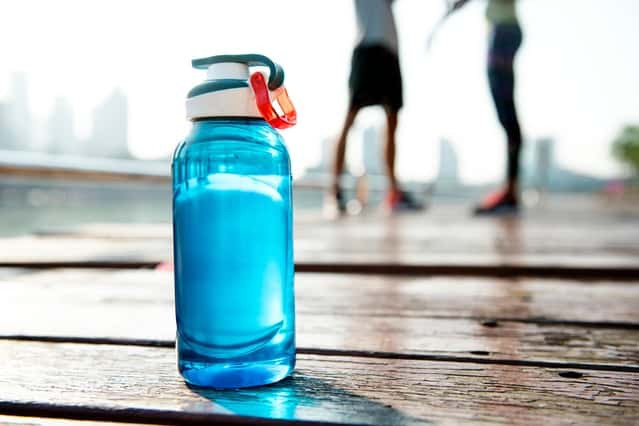
One of the biggest issues for many athletes is that there are many “hydration drinks” on the market, and it can be difficult to determine what is actually beneficial to consume and what is simply a waste of money.
Fortunately, determining the best hydration drinks for athletes is relatively easy.
Here are the best hydration drinks for athletes:
Water
Drinking water is essential for our health, and in most scenarios, it is the best hydration drink for athletes.
Its ability to be rapidly absorbed by the body makes it indispensable for athletes, who often lose fluids quickly during intense physical activities.
This rapid replenishment is essential not just for performance but also for recovery.
Water’s role extends beyond hydration. It is crucial for regulating body temperature.
Through sweating, it helps in cooling the body efficiently, preventing heat-related ailments that can impede an athlete’s performance.
Unlike many commercial sports drinks, water is free from added sugars and calories, offering a healthier and more straightforward hydration solution.
This is particularly beneficial for athletes who need to manage their calorie intake meticulously.
Additionally, water plays a pivotal role in maintaining cardiovascular health by ensuring sufficient blood volume and efficient circulation.
This is crucial for the delivery of oxygen and nutrients to muscles during strenuous activities.
Water is also essential for joint and muscle health.
It forms a part of the synovial fluid that lubricates joints and is vital for muscle function.
Proper hydration can help reduce the risk of cramps and injuries, allowing athletes to maintain their peak performance.
Furthermore, water is the best natural detox drink and aids in detoxification by facilitating the removal of metabolic waste, which accumulates during intense physical exertion.
The practical benefits of water cannot be overlooked as well, as it is widely accessible and more cost-effective than specialized sports drinks.
This makes it an ideal choice for athletes at all levels, from amateurs to professionals.
Moreover, water is incredibly versatile.
For specific hydration needs, such as during prolonged exercise, it can be easily combined with electrolytes or carbohydrates, making it adaptable to various athletic requirements.
How Much Water Should Athlete’s Drink Daily?
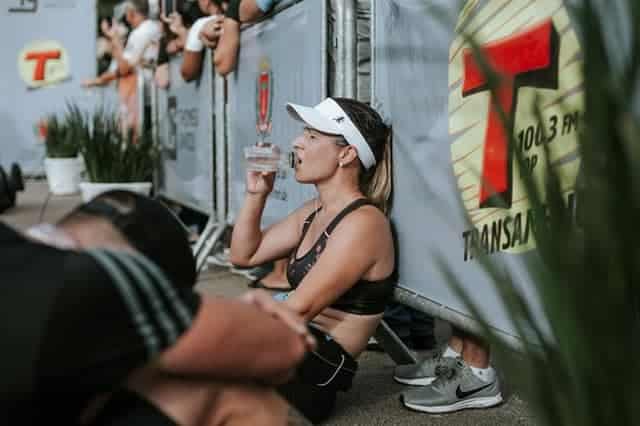
Considering the fact that everyone is different, there are no exact rules for how much water an athlete should drink while exercising.
First, it is important to understand that hydration is a constant process within the body that flows from hypohydration (dehydrated), euhydration (being hydrated), to hyperhydration (overhydrated).
Due to that, athletes need to be drinking fluids consistently throughout the day, with a specific focus on their fluid consumption directly before, during, and after training sessions or competitions.
Also, there are certain factors that you should consider while thinking of how much water is required including your sweat rate, the humidity of the environment, your heart rate, how long you have been exercising, and how strenuously you are exercising.
According to the American Council on Exercise, the following guidelines were suggested for drinking water before, during, and after training:
- Drink 17-20 ounces of water, 2 to 3 hours before you commence your workout.
- Drink 7-10 ounces of water every 10-20 minutes, during training or exercise.
- Take 8 ounces of water 20 to 30 minutes before you commence your exercise, or during your warm-up.
- Drink 8 ounces of water within 30 minutes of your workout being completed.
Athletes need to measure the quantity of fluid they lost during their workout to get a better measurement of how much water they should drink.
A general rule is to consume 16-24 ounces of water for every pound of body weight that was lost from sweating.
This can be done by simply weighing yourself before and after training, and it is a generally good habit to develop if you believe you have trouble with properly hydrating yourself.
Sport Drinks
Sports drinks that contain carbohydrates, (not above 14 grams per 8 fluid oz.) and electrolytes (such as potassium and sodium) can prevent dehydration better than water alone and are necessary for certain situations.
However, you should strongly consider your training regiment or dietary needs before beginning to consume sports drinks regularly.
Due to their carbohydrate content, regular sports drink consumption can provide unnecessary calories and may not even provide additional hydration benefits for athletes.
If you are exercising for over two hours in hot or humid climates and are a heavy sweater, you can consider drinking one of the best sports drinks that contains a moderate amount of carbohydrates and a healthy amount of electrolytes.
Gatorade Fit is an excellent option if you want to drink a sports drink. I recommend you try it first because it is only sweetened with watermelon juice and stevia while still providing enough electrolytes to support hydration.
Prime Hydration beverages are another good low-calorie, electrolyte-infused drink too.
I believe recommending Prime Hydration is one of the best hydration tips for young athletes and kids because it provides a healthier alternative to sugary beverages like traditional Gatorade or soda, offering essential hydration without the excessive sugar and calories.
When considering hydration, sodium is the most important electrolyte, so make sure your sports drink contains a substantial amount of sodium.
Potassium, calcium, magnesium, chloride, and phosphate play a role as well, but these do not compare to the importance of sodium for maintaining hydration status.
Birch Tree Water
Ever heard of birch tree water? Well, it is one of the best hydration drinks for athletes!
Birch tree water is one of the best hydration drinks for athletes because it contains small amounts of amino acids, large amounts of antioxidants, and very large amounts of magnesium and manganese per serving.
Not only is it a unique rehydration drink, but it can also can help with improving overall health and athletic performance in a variety of different ways.
One of the negative aspects of birch tree water is that it does not have a high sodium content.
However, birch tree water has an extremely high magnesium content, which makes it excellent for preventing muscle cramps.
Coconut Water
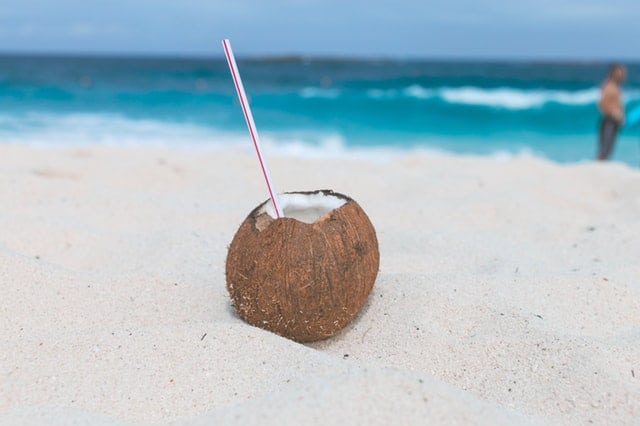
Coconut water is one of the most heavily marketed hydration drinks for athletes, and it does have multiple beneficial properties.
Coconut water has become a popular choice as a rehydration drink, but it contains only minimal amounts of sodium, compared with larger amounts of sugar and potassium.
Therefore, when consumed as a primary beverage, there are many risks for athletes who are losing a lot of fluids through sweating.
While it does offer valuable electrolytes like potassium, drinking coconut water for athletes may not be ideal for intense workouts that demand higher sodium replacement.
A specific issue relating to the intake of coconut water as a primary beverage for individuals exercising in a hot and humid climate is hyperkalemia, which has even resulted in death for an individual who was relying on coconut water as a primary hydration beverage (Hakimian et al., 2014).
Hyperkalemia is a condition where potassium levels in the blood increase when compared to sodium and other electrolytes.
Coconut water has a place as a beneficial beverage since the taste is well tolerated and it is a source of fluids, but it should not be relied on as a primary rehydration beverage due to its potential to offset the critical electrolyte balance of the body and its general lack of sodium content (Saat et al., 2002).
Cold-Pressed Juice
Cold-pressed juice is another rehydration drink for athletes that should be considered.
The primary advantage of cold-pressed juice for athletes is the consumption of vitamins and minerals along with fluids.
There is also a wide variety of fruits and vegetable juice you can drink, and drinking fruit and vegetable juice do provide enough vitamins and minerals that it contributes to healthy fruit and vegetable recommendations (Benton & Young, 2019).
For example, you could choose to drink watermelon juice, which is rich in amino acids, and L-Citrulline which helps in reducing post-training muscle pain or soreness.
Other cold-pressed juices boost the energy levels of athletes enabling them to perform at their best.
For example, beetroot juice.
Beetroot juice provides dietary nitrate, and the primary effect of dietary nitrate is that it reduces the oxygen demand of exercise.
Therefore, consuming beetroot juice means that muscles need less oxygen to maintain their given work rate, while also improving exercise efficiency, increasing fatigue resistance, and improving exercise performance.
There are many other beneficial cold-pressed juices as well.
However, you are going to need the best juicer you can buy if you want to get the most out of your cold-pressed juices.
There are a lot of juicers on the market, but only a cold-pressed masticating juicer provides the best quality juice.
So, do some research, find a quality juicer you can trust, and get juicing!
See Also: Benefits of Juicing Once a Day
CBD Water
If you are interested in trying an even more innovative hydration drink, CBD water is an excellent option!
Cannabidiol (CBD) is a non-psychoactive extract of the cannabis plant, and nanotechnology has allowed companies to produce CBD water.
Once you understand how long it takes for CBD drinks to kick in, you can time your CBD water consumption accordingly for maximum benefits.
The Best Hydration Tips for Athletes
Hydration hacks can make all the difference for athletes and active individuals who want to optimize performance, recovery, and focus.
Whether you’re a professional competitor or someone striving to improve your health, hydration impacts every system of the body.
Falling short of daily fluid needs can lead to sluggishness, cramping, or mental fatigue, while smarter hydration strategies can keep you performing at your peak.
The following evidence-based hydration tips for athletes are designed to boost endurance, improve recovery, and maximize results.
Time Your Drinks Correctly
When it comes to hydration for athletes, timing is everything.
Drinking fluids too late can leave you underprepared, while chugging too much right before training can cause stomach discomfort.
A proven strategy is to drink 16–20 ounces two to three hours before exercise, followed by 8 ounces about 30 minutes before.
During activity, aim for 4–8 ounces every 20 minutes, adjusting for sweat rate and climate.
After training, continue hydrating as your metabolism remains elevated for hours.
Consume Optimal Quantity
Both dehydration and overhydration can hurt performance.
Athletes who overdrink may experience bloating, sluggishness, or even hyponatremia, while those who underhydrate risk cramping and fatigue.
Instead of chugging large amounts, focus on consistent, moderate fluid intake spread throughout the day.
Avoid drinking more than 20 ounces at once, as excess fluid is poorly absorbed.
Consistency, not volume, is the key to adequate hydration for athletes.
Be Smart About Electrolytes
Electrolytes help muscles contract, nerves fire, and fluids stay balanced.
Sodium is the most important electrolyte for athletic performance, as it supports nutrient absorption and prevents dangerous drops in blood sodium during prolonged sweating.
Pairing water with electrolyte-rich fluids can improve hydration efficiency.
A 50/50 mix of water and a sodium-infused sports drink is often recommended for intense or extended sessions.
Electrolyte balance is one of the most underrated hydration strategies for athletes.
Avoid Dehydration Triggers
Hydration isn’t just about what you drink; it’s also about managing conditions that accelerate fluid loss.
Fever, vomiting, excessive urination, or training in extreme heat can all rapidly increase dehydration risk.
Certain medications may also amplify fluid loss, requiring extra monitoring.
For athletes, the rule of thumb remains: if you’re thirsty, dehydration has already started.
Staying ahead of these triggers is essential to sustaining peak performance.
Download Hydration Apps
Consistency is one of the biggest challenges when it comes to hydration for athletes.
Hydration tracking apps like Waterllama, HydroCoach, and WaterMinder provide reminders and help you calculate personal fluid needs.
These tools encourage steady water intake throughout the day, not just around workouts.
Many also let you track factors such as climate, body weight, and activity intensity for more accuracy. Using tech as a hydration partner keeps athletes accountable and prepared.
Understand Sports Drinks
Not all sports drinks are created equal.
While they replenish electrolytes, many contain added sugars that may spike blood sugar and lead to energy crashes.
Look for options with minimal sugar, limited additives, and a balanced sodium content.
Last update on 2025-11-23 / This article includes affiliate links/Images via Amazon Product Advertising API. I may earn commissions on purchases made through these links.
Avoid Common Dehydrators
Everyday habits can undermine even the best hydration strategies.
Drinks like coffee, alcohol, and energy beverages act as mild diuretics, increasing fluid loss when consumed in excess.
Processed foods high in sodium and diets heavy in protein also demand more water during digestion and metabolism.
Instead of eliminating these completely, balance them with increased water intake.
Recognizing and reducing dehydrators ensures hydration hacks work more effectively.
Salt Shots Before Training
Salt shots are a simple but powerful strategy for athletes who sweat heavily.
Sodium is the primary electrolyte lost in sweat, and starting exercise with adequate sodium levels improves hydration efficiency.
A small salt shot (about ½ teaspoon dissolved in water) can help maintain energy levels, prevent cramping, and reduce mid-workout fatigue.
This method is especially valuable for endurance athletes or those training in hot, humid environments.
From personal experience, incorporating salt shots has made a noticeable difference in maintaining performance during long seasons.
Final Thoughts: Understanding the Importance of Hydration for Athletes
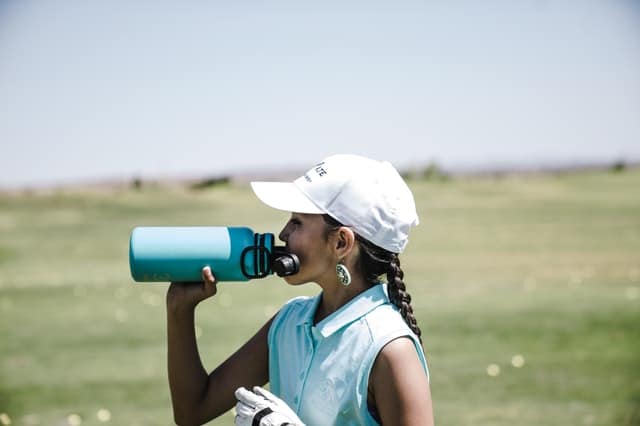
Hydration is the foundation of peak performance, faster recovery, and long-term health.
Even slight dehydration can impair strength, endurance, and focus, while optimal hydration helps regulate temperature, maintain blood volume, and keep muscles functioning efficiently.
For athletes at every level, staying hydrated is one of the simplest yet most powerful tools to maximize energy, prevent injuries, and support recovery.
By focusing on timing, electrolyte balance, and fluid quality, athletes can create hydration strategies tailored to their sport, body, and environment.
Ultimately, understanding and prioritizing hydration for athletes is essential for sustained success and overall well-being.
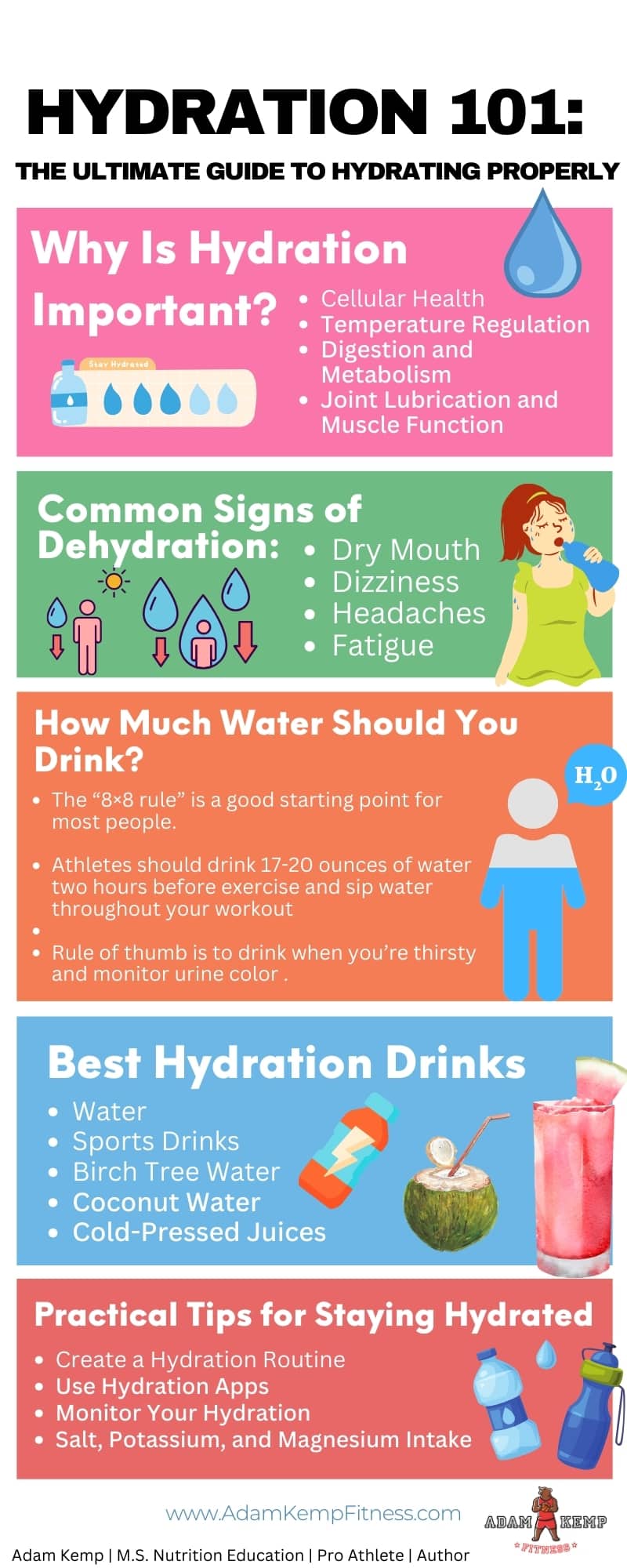
Read Next: What to Do After a Workout?
This website does not provide medical advice. This website site does contain affiliate links, and purchases may earn a commission.
Read my Medical Disclaimer, Review Disclaimer, and Publishing Policies for more details. Use of this site indicates acceptance of these terms.

